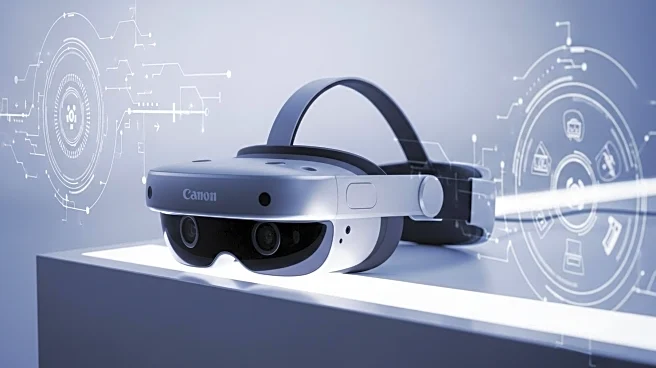What's Happening?
Major technology companies are gearing up to revolutionize the augmented reality (AR) market by 2025, with several key players unveiling new devices and strategies that could potentially replace smartphones. Apple is reportedly working on a 'liquid glass' design that promises lighter, lens-driven frames, moving away from bulky headsets. Meta has launched Ray-Ban glasses with built-in displays, testing the wearability of AR in everyday life. Chinese manufacturers like Rokid are shipping smaller, consumer-friendly AR glasses, increasing pressure on Western brands to match their price and portability. These developments are part of a broader trend where companies are investing heavily in AR technology, aiming to integrate it into daily consumer activities such as shopping and work.
Why It's Important?
The push towards AR technology signifies a potential shift in how consumers interact with digital content. If successful, AR devices could replace smartphones as the primary tool for accessing information and entertainment. This transition could impact various industries, including retail, where AR overlays might enhance shopping experiences, and software development, where new applications will be needed to support AR interfaces. Companies that succeed in making AR devices affordable and practical for everyday use stand to gain significant market share, while those that fail to adapt may lose relevance. The competition among tech giants to lead this innovation could drive rapid advancements in AR technology, benefiting consumers with more choices and better products.
What's Next?
As AR technology continues to develop, consumers can expect to see more affordable and stylish AR glasses entering the market. Core applications are likely to add AR overlays, enhancing user experiences in areas like navigation and social media. The success of these devices will depend on their ability to solve real-world tasks and integrate seamlessly into daily life. Companies will need to address challenges such as battery life, display quality, and user comfort to ensure widespread adoption. The next few years will be crucial as tech companies race to refine their AR offerings and capture consumer interest.
Beyond the Headlines
The rise of AR technology could have deeper implications for privacy and data security, as these devices may collect and process vast amounts of personal information. Ethical considerations around the use of AR in public spaces and its impact on social interactions will need to be addressed. Additionally, the cultural shift towards AR could influence fashion trends, as wearable technology becomes more integrated into everyday attire. Long-term, AR could redefine how people perceive and interact with their environment, leading to new forms of communication and collaboration.











